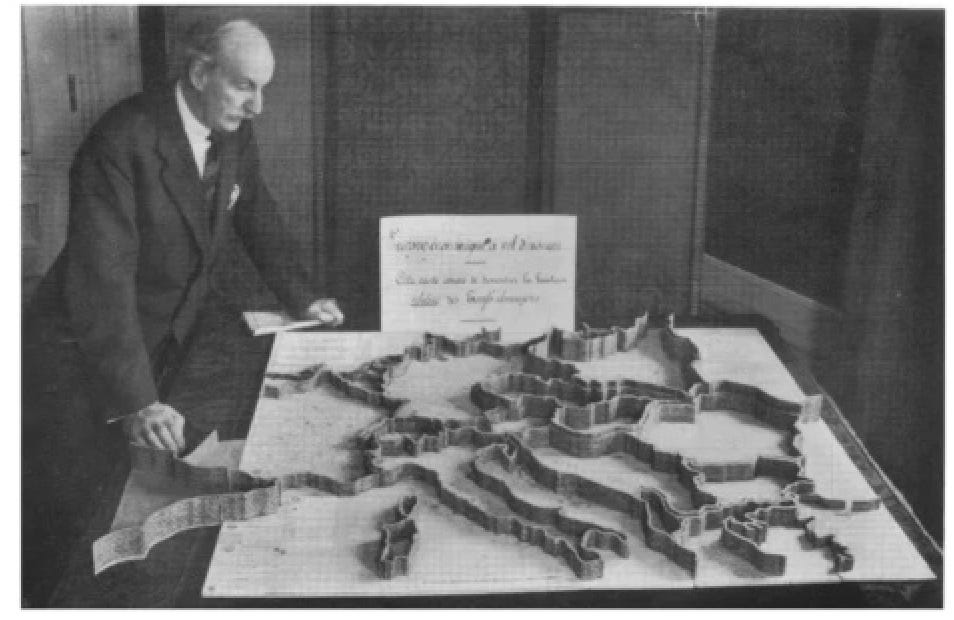Weapons of the Week #3: Trade Wars are _____ Wars
Is US-China conflict "almost surely going to be a truly wonderful thing"? Are the tariffs good or bad for the climate? Plus: long, thick pipelines; fascist anti-militarism, and more!
Above: Clive Morrison-Bell’s physical representation of trade barriers as “walls,” with heights scaled in proportion to tariff levels, c. 1926.
The big geopolitics/political economy story of the last week was the Biden administration’s announcement of steep tariffs against a range of Chinese products, including basic metals, electrical vehicles, semiconductors, and batteries. Before you decide whether this is good or bad, the first question is whether it’s as a big deal. Many people think so: pro-Biden voices are saying that “there is currently no major party or presidential candidate that you can vote for in America that is even remotely interested in free trade”; critics warning that “the global trade system is disintegrating as you read this”; and our always objective newspaper of record proclaiming “the end of an era for cheap Chinese goods.”
At the same time, critics and champions alike stress the limited scope of the action. “A senior administration official” told CNN that “the White House believes the new tariffs introduced this week won’t raise prices because they apply to product groups that are symbolic, but represent only a small amount of US imports.” According to CSIS, the targeted products “together account[ed] for $18 billion in 2023, or only 4.2 percent of all of U.S. imports from China.” Economists, at least the ones CNN called up, expect “a minimal near-term impact on GDP, inflation and monetary policy,” perhaps as low as a “rounding error.” The administration sells this as a surgical strike, while skeptics say the tariffs “don’t really do anything and [are] maybe incoherent.”
Econometrics aside, there are qualitative reasons not to jump to epochal conclusions. In the New Statesman, Quinn Slobodian warns that we have become “addicted” to “thinking in paradigms.” This creates “a permanent incentive for political actors to loudly announce a break with all that has come before.”1 Slobodian points out that the primary instrument of Trump-Biden economic nationalism, Section 301 actions, was established by the Trade Reform Act of 1974. In other words, the presidential power underlying post-neoliberalism is a product of the old brave new world of neoliberal globalization. Today, both insurgent Trumpists and nostalgic internationalists imagine that Ronald Reagan was some kind of free market fundamentalist. But the Gipper himself imposed Section 301 tariffs—on semiconductors no less.
Why is this a matter for Weapons of the Week? While there are plenty of possible angles on the tariffs, at least two are military-industrial. First, the tariffs are being justified as a national security measure. As Noah Smith puts it, “to have domestic manufacturing available for military repurposing, it’s probably necessary to erect trade barriers…it’s just a cold, hard military reality.” Self-identified neoliberal Brad DeLong also explains his conversion with reference to a foxhole: “A sudden shift to a world in which there are major wars that stay subnuclear but nevertheless require a substantial manufacturing base has profoundly changed the game.”2
In addition to military-industrial motivations for tariffs, the tariffs may have major effects on the defense economy. If economic decoupling precedes, or precipitates, military conflict, the most important legacy of the tariffs will be a generalized rearmament, not a limited program of military-industrial import substitution. In turn, some claim, a major US-China conflict will offer economic advantages. DeLong:
For the world as a whole, pretty much no matter how it ends in terms of indiustrial location, the U.S. and China both pouring money into Silicon Valley and Pearl River Delta engineering is almost surely going to be a truly wonderful thing. Technological progress benefits of Cold War, round II. (emphasis added)
I’m not sure that “Cold War, round II” will be in any sense “wonderful.” Cold War I was not a “long peace” but “a vast, deadly conflict that killed millions on battlegrounds across the postcolonial world.” And before he forecasts a pleasantly cold US-China conflict, DeLong himself predicts “major [hot] wars.” Which is it?
Another curious aspect of the national security sales job is that not everyone is on message. Paul Krugman shares with DeLong and Smith the conclusion that the tariffs are not just the right choice but not a choice at all: “in imposing these new tariffs, Biden’s people are doing what they must.” But Krugman doesn’t mention defense at
Keep reading with a 7-day free trial
Subscribe to Origins of Our Time to keep reading this post and get 7 days of free access to the full post archives.



